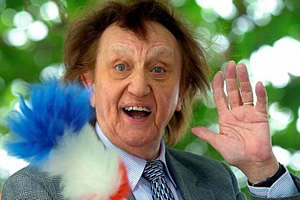Press clippings Page 12
Ken Dodd is tickled to meet the Queen
The Queen visited Merseyside yesterday and had an audience with the uncrowned king of comedy, Ken Dodd.
Richard Palmer, The Daily Express, 2nd December 2011In pictures: Blackpool Comedy Carpet
A huge "comedy carpet" is being unveiled on Blackpool seafront by funnyman Ken Dodd. The concrete and granite installation immortalises catchphrases and jokes by 850 comedians and writers.
BBC News, 10th October 2011BBC producers are a wily bunch. When Eartha Kitt was at the height of her international career it would have been impossible to persuade her to show up at an old music hall theatre in Leeds for a one-song appearance. But Barney Colehan, producer of BBC TV's The Good Old Days for all of its 30-year history, pulled off this coup by telling her that he had arranged for her to use the dressing room that Charlie Chaplin had occupied at the start of his career.
The fact that there was no way of knowing which of the many dressing rooms Chaplin might have used has programme host Paul Merton howling with laughter, one of many occasions when he cracks up over the course of his look at the history of the City Varieties Music Hall in Leeds. It's Britain's oldest music hall and has just reopened after a major refurbishment.
Merton is joined in this celebration of variety shows by Barry Cryer, Roy Hudd and Ken Dodd. The latter was the headline act at the gala reopening of the Varieties on 18 September 2011. Mr Cryer, on the other hand, recalls his first appearance at the venue in the 1950s, when music hall was out of favour and he shared the stage with ladies performing acts entitled "Fun and Dames" and "See the Nipples and Die!" There's no such roll call these days and, with the success of Britain's Got Talent, Merton hopes for a resurgence of variety shows.
Jane Anderson, Radio Times, 1st October 2011Between 1953 and 1983, the Leeds City Varieties music hall was known around the country as the home of the BBC's Victorian-style entertainment show The Good Old Days. In this enjoyably droll and observational tour through the BBC archives, Paul Merton investigates the history of the venue - which has recently undergone a multi-million pound refurbishment - and wonders if the music hall tradition is due a comeback after years in the wilderness. He's aided in this task by a handful of evocative clips from the TV show as well as interviews with three of the oldest hands in the business: Ken Dodd, Barry Cryer and Roy Hudd.
Pete Naughton, The Telegraph, 30th September 2011Comedy Britain proved that Barker was the funny one
Ronnie Corbett's Comedy Britain saw the comedian cavort with David Walliams, Ken Dodd and Rob Brydon, but once again it failed to raise a laugh.
Rachel Tarley, Metro, 14th August 2011The second half of the diminutive veteran's fluffy history of comedy sees him snoop round Harry Hill's unique prop store - see if you can spot stuff used in TV Burp. Next Corbett takes afternoon tea with David Walliams and his mother. Cue copious talk of cross-dressing. He also joins Rob Brydon for a round of golf, visits Dara O'Briain's favourite comedy club and takes a ferry across the Mersey with Ken Dodd. Finally, Corbett retells one of his most loved, free-wheeling monologues from the chair made famous in The Two Ronnies - and gets touchingly dewy-eyed over the memories it brings back of former partner-in-mirth Ronnie Barker.
The Telegraph, 12th August 2011Ken Dodd slams new comedians
Legendary funnyman Ken Dodd has slammed modern comedy as "aggressive" and "cynical".
The Sun, 10th August 2011Video: Ken Dodd tips Alex Ferguson's horse for National
After that vital victory over Chelsea in the Champions League, could Manchester United boss Sir Alex Ferguson continue his winning streak on a rather different field at the weekend?
Dianne Bourne, Manchester Evening News, 8th April 2011First shown on BBC Four, the second half of Michael Grade's history of the variety era examines what happened to the entertainers once the theatres closed and TV cameras beckoned. He talks to stars who managed to make the transition from stage to screen, among them Bruce Forsyth, Des O'Connor and Ken Dodd. Grade also looks at Sunday Night at the London Palladium, plus the impact of Tommy Cooper and Morecambe & Wise.
Michael Hogan, The Telegraph, 25th March 2011Enter a lost world of entertainment with this celebration of the post-war heyday of variety, in a BBC4 programme shown last month. Michael Grade is our qualified guide - he joined the family theatrical agency in 1966 - and delivers a warm and funny show, full of good anecdotes. That's because he lets veteran entertainers and agents do much of the talking - Val Doonican, Bruce Forsyth, Ken Dodd, Roy Hudd, Barry Cryer and Janet Brown among them. Although largely filmed at the London Palladium, many of their recollections concern the third rate halls, the "number threes" - Bilston Theatre Royal and Attercliffe Palace keep cropping up. They are unforgettable, but for all the wrong reasons, as are tales of theatrical digs. A parade of clips features comics, ventriloquists, dancers, jugglers and animal acts - from Max Miller to Memory Man, and Kardoma the flag act to Koringa the lady snake charmer. Nostalgia, social history, however you label it, there's nothing po-faced about this supremely entertaining show.
Geoff Ellis, Radio Times, 19th March 2011
